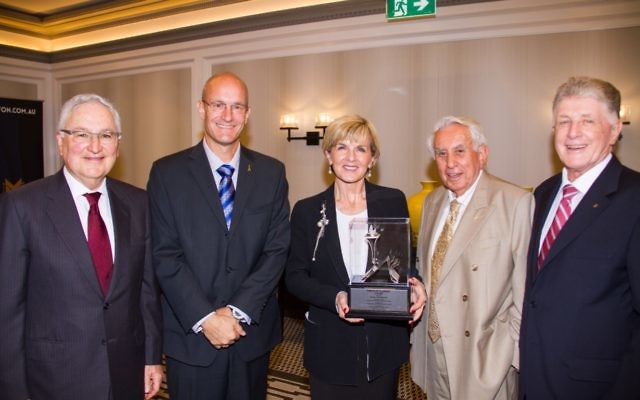‘A special friendship’
“ISRAEL’S struggles are our struggles. Their fight is our fight. Israel’s values are our values.”

“ISRAEL’S struggles are our struggles. Their fight is our fight. Israel’s values are our values.”
A standing ovation greeted Minister for Foreign Affairs Julie Bishop after she delivered a stirring speech praising Israel for its democratic values and its innovation at the Australian Friends of the Hebrew University’s gala dinner in Sydney on Sunday night.
Prior to her speech at the InterContinental Hotel in Double Bay, Bishop was presented with the university’s Torch of Learning Award by the Hebrew University’s vice-president for research and development Professor Shy Arkin.
The honour was in recognition of her support for Israel at the United Nations and for denouncing the anti-Israel Boycott, Divestment and Sanctions (BDS) movement.
“This university has a proud history of scholarship, diversity, multiculturalism, humanitarianism,” she said in accepting the award. “It remains a world leader in providing education – creating and nurturing great thinkers and innovators from more than 65 countries.”
Bishop praised the university’s research as having worldwide benefits, adding: “The Hebrew University has worked to foster ties between nations of all shape and composition – different people, ethnicities, religious backgrounds; Jews, Arabs, Christians, Muslims.
“That openness and diversity is a critical part of building a more positive future for the Middle East.”
She called the State of Israel “a source of optimism” in a struggling region. “In contrast to the regional political, social and military turmoil, Israel remains a strong, democratic state built on positive values that remain of contemporary application,” she said. “It is a self-reliant society committed to innovation, to growth, to transcending the challenges of the past on its way to creating a better future.”
She said Australia and Israel share many attributes in common, such as resourcefulness, confidence and optimism.
“We also share the important values that underpin democracy, freedom, openness and a commitment to rule of law and pluralistic societies,” she said.
She added that she had given “personal assurances” to Israeli Prime Minister Benjamin Netanyahu of Australia’s continued friendship and staunch support for Israel.
“Tonight, in accepting the Torch of Learning Award, I commit anew to the powerful relationship between our two countries,” she concluded. “Israel’s struggles are our struggles. Their fight is our fight. Israel’s opportunities are our opportunities. Israel’s values are our values. We must both be prepared to continue to defend them.
“Ours is a special friendship and long may it endure.”
Following Bishop’s speech, Arkin once again took to the podium to outline some of the exciting technology being developed at the Hebrew University.
One such technology, Mobileye, is being fitted to all new Volvo, BMW and Mercedes vehicles and prevents motor accidents.
“What does research at the Hebrew University result [in]? It results in saving lives,” Arkin said.
“US insurance companies maintain that 30 to 40 per cent of accidents are prevented by Mobileye.”
Another technology, Orcam, assists visually impaired people by reading information to them such as the newspaper, traffic lights and numbers on buses, while the technology Briefcam was instrumental in catching the Boston bombers.
Arkin also spoke about medical research at the Hebrew University which is making a difference in the treatment of dementia, ovarian cancer and Parkinson’s disease.
GARETH NARUNSKY

comments